“There are limits to artistic self-indulgence, limits to how long a filmmaker can keep spinning his creative wheels before his work approaches self-parody, and limits to the tolerance of even a devoted specialized audience for artistic vacuity, and they are all well exceeded by The Limits of Control. This discerningly photographed travelogue of modern Spain features Jim Jarmusch in shallow poetaster mode, grafting familiar quasi-philosophical doodles and trendy cameos onto a woolly hitman’s journey. The limit on the theatrical potential for this Focus Features release is extreme.” — from Todd McCarthy‘s Variety review, posted yesterday afternoon.
Month: April 2009
Apatow Ups His Game
There have been a couple of recent bellwether showings of Judd Apatow ‘s Funny People (Universal, 7.31) in Los Angeles — a friends-of-Apatow screening plus a research screening that happened (I’m told) about eight days ago. And the word is better than pretty good, “amazing,” “James L. Brooksian,” etc. The leads, of course, are Adam Sandler and Seth Rogen, with Leslie Mann, Eric Bana, Jonah Hill and Jason Schwartzman in supporting.
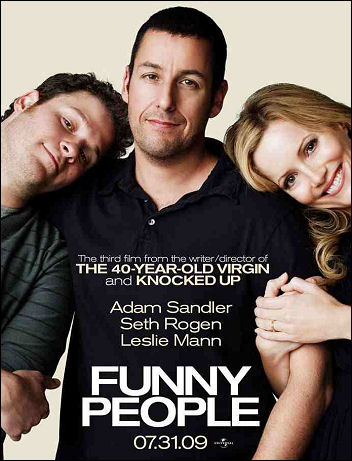
Possibly an award-level thing, a director friend said this morning, although he was just passing along the chatter. It’s more in the realm of Sandler for Best Actor and Apatow’s script for Best Original Screenplay, he speculated, than a Best Picture shot…but you never know.
So I called a non-vested guy who’s seen it, and here’s what he said: “Really funny, a really sweet movie, a lot of veracity…really a brilliant film. Everybody’s game goes up a lot. It’s a James L. Brooks-level thing and a great role for Adam. It’s a perfect blend of everything Sandler has done in a serious vein. The film could be a bit of a marketing problem because it’s about show business but it’s so real.. It’s about a famous guy, a comedian, having to deal with the fact hat he has no life and nobody to turn to. But he gets better [through a relationship with a younger comic]…it’s basically a love letter to having a family.”
Could be a “marketing problem” because it’s about show business? Average Joes are resolved in their opposition to a movie set in the entertainment community? What kind of stupid-ass attitude is that?
A guy in the Universal loop says he “would argue a bit on the ‘marketing problem’ as the trailer [has] consistently scored tremendously well, no matter what kind of movie it’s shown with. Audiences are really responding very very well so far and the trailer does not dodge the central conceit of the sickness/rebirth.”
I’ve had the script for a long while and have been too lazy to read it. The IMDB synopsis says it’s about “George (Sandler), a very successful stand-up comedian who learns that he has an untreatable blood disorder and is given less than a year to live. Ira (Rogen) is a struggling up-and-coming stand up comedian who works at a deli and has yet to figure out his onstage persona. One night they perform at the same club and George takes notice of Ira, and hires him to be his semi-personal assistant as well as his friend.”
Hanks and White Wine
There are three reasons I want to attend the Film Society of Lincoln Center’s Tom Hanks tribute next Monday night. One, because of his performance in Cast Away, which I’ve come to admire and respect a bit more every time I see that Robert Zemeckis film. Two, because I truly loved that Barack Obama video testimonial that he put up last May. And three, because he’s one of the nicest big-time actors I’ve ever met in my 28 or 29 years in the business.
Mild Soloist Gratitude
Paramount’s decision to boot Joe Wright‘s The Soloist out of the ’08 Oscar season and into a late spring ’09 release was a message to the masses that it didn’t work as an awards-level thing and perhaps not even in a regular-paying-audience sense. And now the opening-day reviews — a lousy 54% positive from the Rotten Tomato grunts and a marginally better 65% positive from the creme de la creme — seem to underscore that.
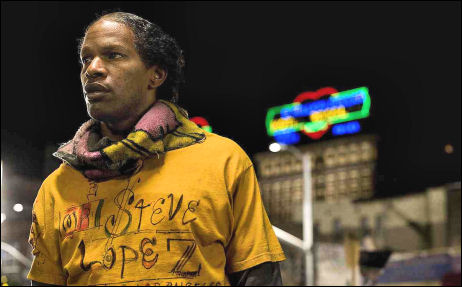
But it’s far from a disaster. You could call it mildly disappointing but I wouldn’t. Not altogether, I mean. Somebody wrote something about it being a kind of magic negro tale — a movie about how a black guy with amazing spiritual currents saves a white guy from becoming too wussy or distracted or divorced from life’s essential bounty. Parts of The Soloist seem to work that end of the room, but…honestly? I just can’t work up a head of steam about this film. And yet it’s very decently crafted and smartly acted. A not-unsatisfying sit as far as it goes.
It’s based on a book of the same title by L.A. Times columnist Steve Lopez. The subtitle of the book: “A lost dream, an unlikely friendship, and the redemptive power of music.” Sounds like a movie, doesn’t it? Except I’m not sure after seeing the film that it’s the greatest story or the most inviting subject in the world. The basic drill concerns Lopez (Robert Downey, Jr.) seeing a story in a schizophrenic street guy (Jamie Foxx) who plays a mean bass viola, and who turns out to be a disturbed musical genius named Nathaniel Ayers.
Lopez begins to write columns about Ayers as well as take him on a personal aid-and-assist project. Ayers is saved from the streets and winds up at the end in a somewhat happier or at least less anguished state; Lopez learns about classical music, about the horrors of being mentally ill and itinerant, and — here’s the movie-pitch part — to be a slightly better (i.e., more giving) human being.
And yet The Soloist is not Shine. The fulfillment-achieved-at-the-climax formula is not strictly followed, and I respect that. But it doesn’t really have what I’d call an “ending,” and the bottom line is that you’re saying to yourself as it comes to a close, “That was nice but…wait, what was it actually about?”
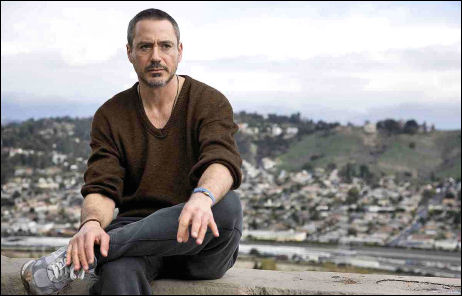
The theme is a Yoda-type thing, i.e., “Do or not do — there is no try.” If you’re going to be a friend to someone, be a friend all the way without any mucking around. There’s no room in friendship for halfway measures or dilletanteism. This is the Dr. Phil life lesson that Lopez learns at the end, or something close to this. I sat there and went, “Uh-huh, fine, whatever.” My sister was schizophrenic for most of her life so I know whereof I speak. I also know it’s all about meds — either they take them or they don’t.
Foxx’s performance did remind me of my sister when she was in a really bad way, back in her late teens and early 20s. Schizophrenic states let the light in in an R.D. Laingian way, yes, but it also beats the body and spirit to a pulp. It’s a horribly turbulent and stressful thing to deal with — a force that constantly hammers and agitates. Foxx conveys that with vigorous accuracy. He’s clearly gotten into that hyper place in his head (and it’s no place you want to get close to if you can avoid it — trust me). It’s a seriously admirable performance.
And Downey is fine. He’s playing a focused, low-key, hard-working, highly stressed journalist. I know a little something about that world (although I’m more of a keyed-up type) and I believed him so…whatever, leave him alone.
I admired and was actually grateful for Wright’s visual attempts to get into Foxx’s head when he’s playing or listening to music. At one point Wright sends the camera soaring above the streets in a way that recalls the floating-feather sequence in Forrest Gump, and in another on a kind of voyage into a crimson cosmic kingdom that vaguely resembles the famed light-show finale of 2001: A Space Odyssey. It’s not that these sequences are dazzling — they’re just okay — but at least Wright is trying to use the camera in a semi-audacious way.
We’re living through a fairly timid age from a cinematography perspective. In film after film all we seem to get is routine coverage from various angles. Remember that Simon & Garunkel montage in The Graduate when Dustin Hoffman leaps out of the pool and onto his floating air mattress, and how in the blink of an eye the mattress becomes Anne Bancroft sighing after sex? Nobody but nobody does stuff like this any more, so give Wright points for at least attempting to venture beyond.
Tetro After All
Francis Coppola‘s Tetro — his part-color, part-monochrome, all-Vincent Gallo Argentine family drama — will open the Director’s Fortnight section of next month’s Cannes Film Festival. Coppola had previously turned down the festival’s offer of a non-competitive slot. The Director’s Fortnight offer is a sop, but it’s a slight improvement in terms of prestige.
Good Guy or Vanquisher?
The rationale for doing awful things in order to defeat or weaken your enemy was articulated 44 years ago by Cyril Cusack in The Spy Who Came In From The Cold, to wit: “Our work, as I understand it, is based on a single assumption that the West is never going to be the aggressor. We may do disagreeable things but we’re defensive. Our policies are peaceful. But our methods can’t afford to be less ruthless than those of the opposition…can they?
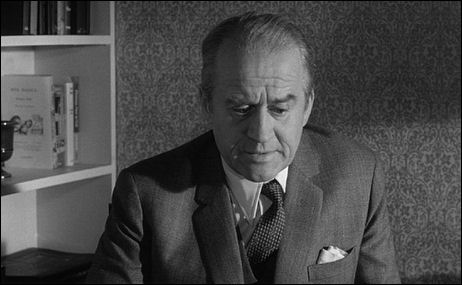
Cyril Cusack as “Control” in Martin Ritt’s The Spy Who Came In From The Cold.
“You know, I’d say, uhm…since the war, our methods — our techniques, that is — and those of the [opposition] have become very much the same. Yes. I mean, occasionally…we have to do wicked things. Very wicked things indeed. But, uh, you can’t be less wicked than your enemies simply because your government’s policy is benevolent. Can you?”
This, essentially, is the right-wing Fox News view of the torture issue. It sounds moderate and reasonable when expressed by Cusack, but crude and boorish and repellent out of the mouth of Sean Hannity.
Here’s Why
A 4.18 German-language Adenblatt article says that Fatih Akin‘s Soul Kitchen isn’t going to Cannes because he didn’t submit it. The German-Turkish director (The Edge of Heaven) simply couldn’t make the Cannes deadline. The piece says that the film, which stars Moritz Bleibtreu, is being cut as we speak and will be ready by June. Same info from this article.
Sorry, Soloist
You’d think that L.A. Times film critic Kenneth Turan might be …how to put it?…partial to slipping on the kid gloves in reviewing The Soloist? Since it’s at least partly an L.A. Times milieu story based on a book by a Times colleague, Steve Lopez, about a relationship he had/has with a gifted but schizophrenic street musician? Uhn, nope.
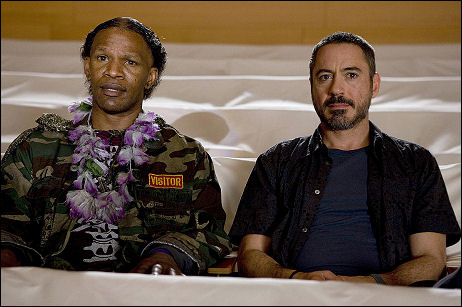
Jamie Foxx,. Robert Downey, Jr. in The Soloist.
“Remember when Lloyd Bentsen told Dan Quayle, ‘I knew Jack Kennedy [and] Senator, you’re no Jack Kennedy’?,” Turan begins. “Well, I felt a little that way when it came to reviewing The Soloist
“Despite all I know I should feel, I can’t help being mightily frustrated by [this film]. I can’t help resenting that it suffered the death of a thousand cuts and, more frustrating still, that all this happened in the name of doing good in the world, of making the story’s powerful lessons more palatable to a wider audience.
“But by consistently and relentlessly overplaying everything, by settling for standard easy emotions when singular and heartfelt was called for, by pushing forward when they should have pulled back, director Joe Wright and screenwriter Susannah Grant have made the story mean less, not more. Instead of enhancing The Soloist‘s appeal, they have come close to eliminating it.
“I could back up and write all this in the reviewer’s traditional third person, but that feels disingenuous. After all, I do know Lopez, whose wonderful Los Angeles Times columns and later book about his unlikely friendship with a gifted but deeply troubled street musician started everything. And I work with Lopez at The Times, which, in an unprecedented gesture, offered its newsroom as a set and has in general bound itself to this movie with remarkable fealty.
“More than that, as a Washington Post reporter when All the President’s Men came out, I’ve experienced working at a newspaper when its exploits became movie material. I know what to expect from this kind of wild ride and, just as important, what to disregard.
“So while it was initially jolting to see the tall, laconic Lopez portrayed by Robert Downey Jr. — not the likeliest person to play him — as a short, voluble bundle of energy, I got over it. Did Marlon Brando resemble Napoleon? Did John Wayne look anything like Genghis Khan? Time to move on.
“I also knew we were a long way from the early days of the movie business, when Hollywood ran roughshod over books, ending an early sound version of Moby-Dick, for instance, with Ahab killing the whale and coming home to his girlfriend. Really.
“If The Soloist had been made in those days, Jamie Foxx‘s Nathaniel Anthony Ayers, a gifted musician battling the horrors of paranoid schizophrenia, would have been cured in a trice and ended up playing a gala concert to a Disney Hall standing ovation. So I am nothing if not grateful for the small favors this film provides.
“[And yet] director Wright seems to relish overdoing whatever he can, not surprising for those who remember how he treated the Bennett family in his Pride & Prejudice. So a cellist who tries to help Ayers can’t be just a good person, he has to be clumsily religious. When Ayers gets to hear a concert in Disney Hall, we can’t just experience the moment, we have to watch a psychedelic light show left over from the Jefferson Airplane playing the Fillmore.
“And we can’t simply enjoy this story for what it is, we have to suffer through bogus and unnecessary slapstick moments like Lopez slipping on his own urine during a hospital visit.”
Louts
At or near the top of my list for pure enjoyment, pure male-mood adventure, pure turn-off-your-brain animal-criminal swagger. (But without beating up on or shooting anyone.) No American youth comedy has ever even tried to be this anti-social or anarchic. It’s way ruder, nervier and more up-the-social-order than any similar-type American youth comedy you can name. American Pie, hide your head in shame.
Not Shown The Money
“Marvel made a choice, and it was a very, very bad choice. They didn’t keep their word. They didn’t honor my contract. They produced a great bounty with the first one but they put it all in the storehouse and you were not allowed in. They did the same thing with Gwyneth Paltrow, from what I’ve been told. They did it with almost everyone except Robert Downey [Jr.]. One of the things that actors need to learn to do is always stick together, one for all and all for one.” — Former Iron Man costar Terrence Howard speaking to Parade‘s Jeanne Wolf.
